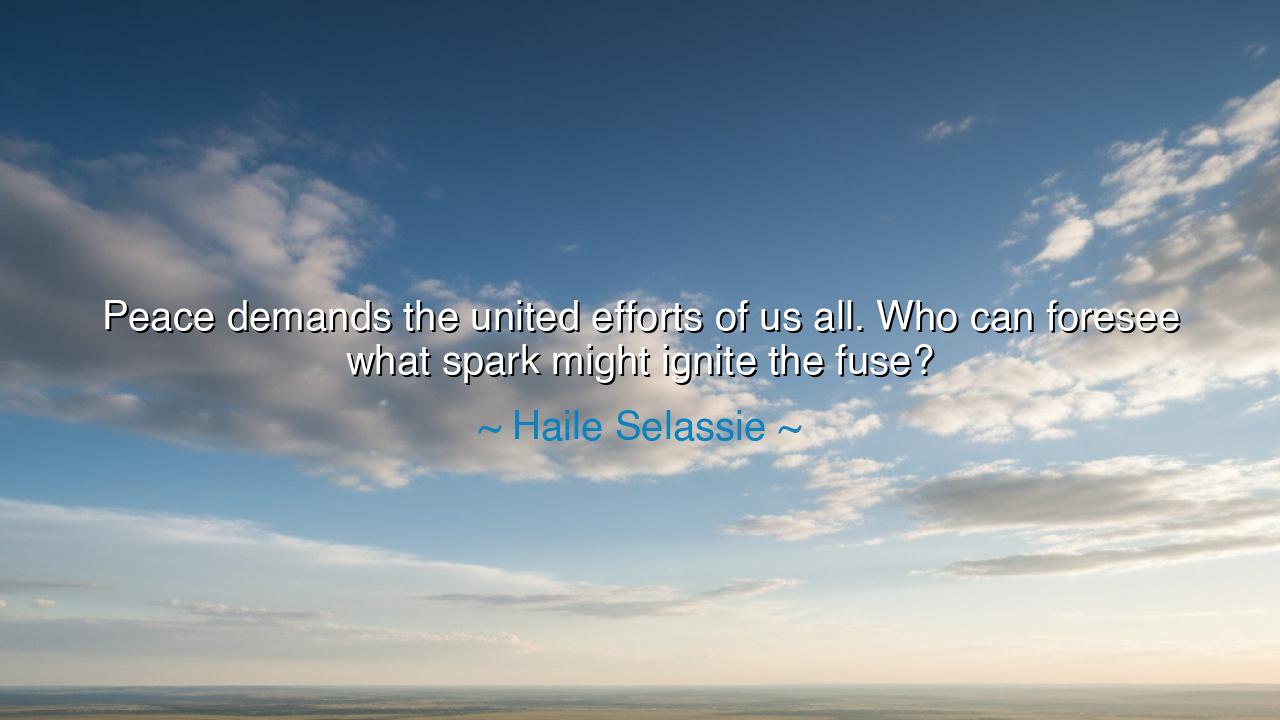
Peace demands the united efforts of us all. Who can foresee what
Peace demands the united efforts of us all. Who can foresee what spark might ignite the fuse?






Haile Selassie, the Lion of Judah and voice of Ethiopia, once proclaimed: “Peace demands the united efforts of us all. Who can foresee what spark might ignite the fuse?” These words were not spoken lightly, but born from the bitter fires of invasion and the desperate cries of his people. Selassie, who carried his nation’s cause before the League of Nations in 1936, knew with piercing clarity that peace is not the work of one man or one nation alone. It requires the labor of all, for conflict may arise from the smallest spark, and once the fire is loosed, no single hand can quench it.
The ancients knew this danger. Thucydides, writing of the Peloponnesian War, showed how small disputes and petty slights swelled into a decades-long conflict that consumed Greece. A quarrel between allies, a skirmish over trade, the bruising of pride — such sparks became a conflagration that toppled empires. Thus Selassie’s warning echoes across the ages: the fuse of war is short, and unless all unite to guard against it, destruction will come swiftly.
History offers vivid proof. The assassination of Archduke Franz Ferdinand in 1914 was a single spark, yet it ignited the Great War. Millions perished, not because nations desired global destruction, but because none acted with unity to preserve peace before it was too late. Treaties, alliances, ambitions, and suspicions fanned the flame until the world was ablaze. It is this very blindness that Selassie sought to cure, pleading for vigilance, for cooperation, for solidarity among nations.
And yet, the world failed him. When Mussolini’s armies invaded Ethiopia, the League of Nations hesitated. They condemned, but did not act. Sanctions were spoken of, but not enforced. Unity failed, and so peace failed. Ethiopia was left to bleed alone, and Selassie’s words became prophecy: the small spark of one invasion lit the fuse of greater war, for within a few years, the whole world was consumed by the Second World War.
Children of tomorrow, hear this warning: peace is not passive. It is not silence, nor the absence of gunfire. Peace is labor. Peace is vigilance. Peace is the shared responsibility of all. To keep it demands courage equal to that of war, for it is easier to ignore danger, easier to hope that fire will not spread, than to unite in time to quench it. But neglect is fatal. One spark left unchecked will destroy a forest; one conflict ignored will engulf the world.
The lesson is clear: never dismiss the small quarrels, the rising tensions, the murmurs of violence. Do not think they will resolve themselves. Stand united, as nations, as communities, as families, to guard peace before the flame takes hold. For the cost of vigilance is small, but the cost of war is beyond measure. Selassie’s wisdom is eternal: it is far better to prevent the fuse from being lit than to fight the fire once it rages.
Practical action flows from this truth. In your life, be the guardian of peace. When disputes arise, step forward to reconcile, not to inflame. In your community, unite against injustice before resentment festers into violence. In the world, support leaders and nations who work for cooperation, for dialogue, for unity. For peace cannot be left to others; it must be the work of all, and each of us is called to labor in it.
So let it be remembered: “Peace demands the united efforts of us all. Who can foresee what spark might ignite the fuse?” Selassie’s cry is a warning and a call to arms — not for war, but for the nobler battle of preserving peace. Stand together, act together, and guard the fragile treasure of peace, for once it is lost, no man can say how far the flames will spread.






AAdministratorAdministrator
Welcome, honored guests. Please leave a comment, we will respond soon